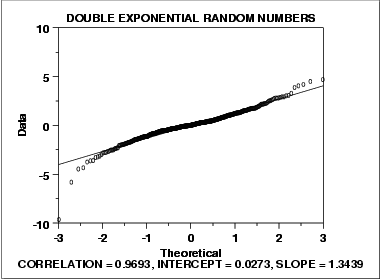1.3. EDA Techniques
1.3.3. Graphical Techniques: Alphabetic
1.3.3.21. Normal Probability Plot
1.3.3.21.3. |
Normal Probability Plot: Data Have Long Tails |

- The normal probability plot shows a reasonably linear pattern in the center of the data. However, the tails, particularly the lower tail, show departures from the fitted line.
- A distribution other than the normal distribution would be a good model for these data.
In this case we can reasonably conclude that the normal distribution can be improved upon as a model for these data. For probability plots that indicate long-tailed distributions, the next step might be to generate a Tukey Lambda PPCC plot. The Tukey Lambda PPCC plot can often be helpful in identifying an appropriate distributional family.

